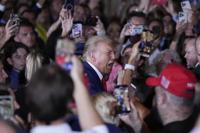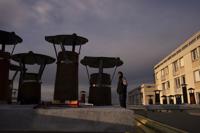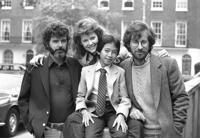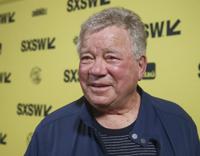In the currency of today’s attention economy, Donald Trump is the world’s richest man.
His in New York was an out-of-court Exhibit A. In returning to that propelled him to tabloid-fodder fame so many years ago, the former president also returned to the very stage where he thrives the most. As he did so, even in an atypically sedate manner, he demonstrated the peculiar way he encounters the world — as luminary and aggrieved party rolled into one.
Love him? Hate him? Don’t care? Doesn’t matter. Just like during his presidency, he commands notice. Still. Thousands of New York City police officers, the U.S. Secret Service and swarms of journalists deployed across lower Manhattan can all attest to that.
It was , the low rung of drama in a criminal case, but it was a full-on spectacle. And calling it that, assessing it in that way, does not diminish it — not in today’s world, where spectacle and all its byproducts drive the attention economy and the cultural conversation.
There was something about Tuesday, and about the five days that preceded it, that was somehow both familiar and deeply abnormal.
For the most part, Americans had the all-Trump, all the time ethos that governed our days between 2016 and, say, mid-2021. So that Trump-flavored thrum that has prevailed since news of the indictment emerged Thursday was hardly new. Familiar, too, was the uneasy collision of exhibition with seriousness, of the mannered machinations of government with the anything-goes rhetoric of reality-TV-inflected, 21st-century populism.
Just as during the Trump presidency, you saw the monuments that Americans build to reassure themselves that their effort to administer a democratic republic is a Very Serious Endeavor. Before, it was the Washington edifices of the executive and legislative branches; on Tuesday it unfolded in a courthouse made of heavy masonry erected into the imposing architecture that enshrines the rule of law.
Yet all that familiarity obscured what was something genuinely new under the American sun: the moment-by-moment chronicling of an ex-president leaving for court, entering court, charged with felonies in court, leaving court in a motorcade headed for the airport to board his private plane, the one with his name very publicly painted on the side.
“Otherworldly is the perfect way to put it,” Dana Bash said on CNN.
LOOKING IN AT TRUMP
We got to see it all, as has become our way. Inside the courthouse, we saw the cinema-verité style of news cameras behind barricades, desperately seeking — and getting — a glimpse. Outside, everything was tracked from above by four news helicopters, a tableau with echoes of a previous slow-motion trip that echoes through the decades: that of the white Bronco driven in 1994 by O.J. Simpson — someone also accused of a high-profile crime.
Three decades separate those two chopper-chronicled scenes. Those years saw the ascent of reality television, the explosion of the internet and social media, and the general domination of tools and mindsets handy for obscuring reality and making American life feel — sometimes deliberately — more and more like a movie. Trump, of course, has been a prominent engine of this sea change, both as performative private citizen and, later, as chief executive.
That American preoccupation with big, loud storylines was on full display Tuesday as anchors, pundits and sources talked and talked and talked. You heard it baked into the language at every turn.
— There was a main character you can’t look away from: A Newsmax anchor awaiting Trump's court appearance called him the “star of the show.”
— There was a metaphorical musical score: “His legal cases will be a soundtrack of his presidential campaign,” CNN’s Jeff Zeleny said.
— There was commercial power. “Donald Trump has made one hell of a brand,” one of his attorneys, Joe Tacopina, said after the arraignment.
— There was disinformation built to sell product: Though no mug shot was taken of the former president during his time in court Tuesday, people raising funds on his behalf quickly and blasted it out to rally the troops and lighten their wallets.
— And there was an unremitting stream of content, led by Trump himself, who posted on his Truth Social account right up until he approached the courthouse and resumed right as he left it. “America was not supposed to be this way,” he said at one point, another of those statements he calibrates perfectly to make his personal tribulations into national ones.
WHOSE MESSAGE?
For so much of his life, Trump has been a narrator, controlling image, message and, often, his preferred version of the truth. With the presidency, he made that approach national policy. But on Tuesday, as rules and laws wrested that sense of control from him, he found himself not the narrator but the narrated. Even with all the attention and criticism across all of the years, that’s a position to which he is deeply unaccustomed.
And from the look of the photos and brief video, it’s not one he liked. As those somber images of him in court flashed across national screens, anchors and pundits used words like “diminished” and “swaggerless.” Not things that Donald Trump generally abides.
“At that moment, that is not a conqueror. That is a granddad having a very bad day.” commentator Van Jones said on CNN after watching the former president’s dejected facial expression as he left Trump Tower before the arraignment.
Yet those same anchors and pundits have said those exact things before, through his campaign and presidency and post-presidency. They’ve tried to narrate for Trump. Somehow, over and over, he reemerges as the master teller of his own story — however much fabulism it contains.
By nightfall he was home at Mar-a-Lago in Florida, backed by American flags, speaking to hundreds of supporters at a rally-style gathering and unspooling sundry grievances in prime time. In doing so, he was trying to seize back that narrative in the way he has always done best: before a crowd hand-picked to enthuse without hesitation and boo right on cue. “I have a Trump-hating judge with a Trump-hating wife and family,” he said.
His intent was obvious — to show that in the arena of the American attention economy, where the fighting forever rages, Donald J. Trump remains a potent force. Commanding attention has been his world, and politics is a realm of attention. Whether the legal realm, which he has successfully avoided until now, will be anywhere near the same for him may be another reality entirely.
___
Ted Anthony, director of new storytelling and newsroom innovation for The Associated Press, has been writing about American culture since 1990. Follow him on Twitter at










































